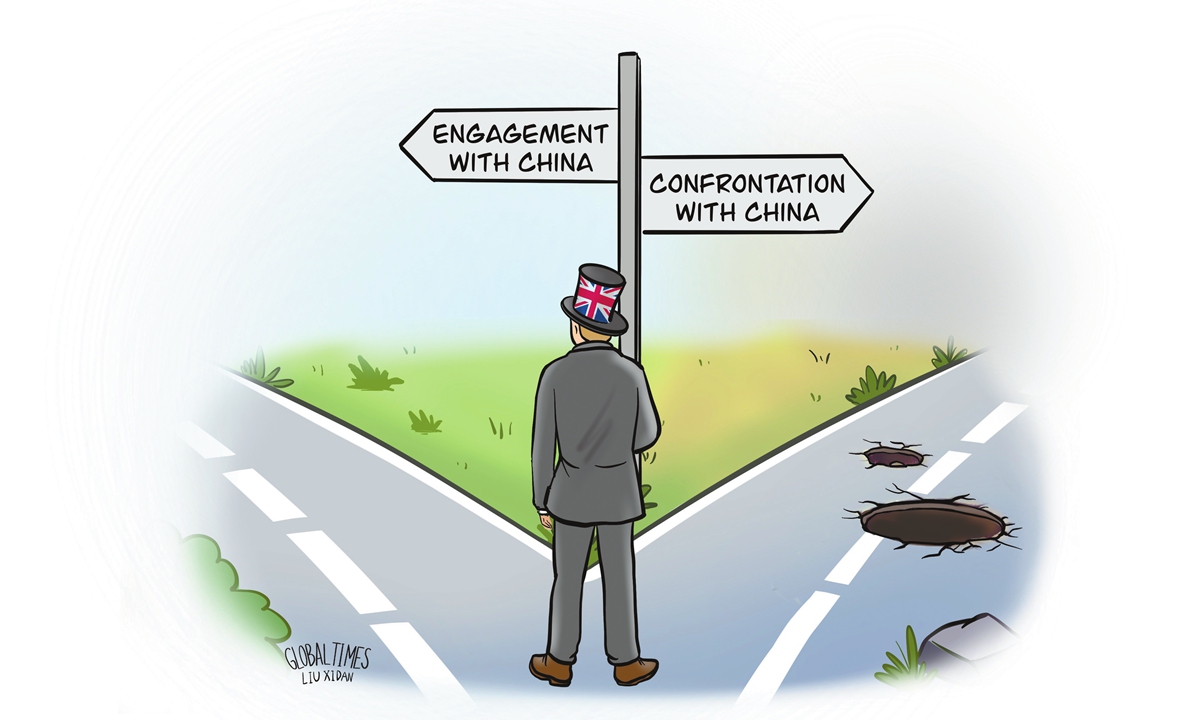Will UK show sincerity in recalibrating China policy and promoting bilateral ties?

Illustration: Liu Xidan/GT
The government of UK Prime Minister Keir Starmer is sending mixed messages regarding China. On one hand, Foreign Secretary David Lammy will visit China from Friday to Saturday, the highest-level trip to China since the Labour government came to power, as he undertakes the government's mission to "seek less confrontational ties" with China, according to Reuters. The British media also revealed that UK Chancellor of the Exchequer Rachel Reeves is considering a visit to China to resume an economic and financial dialogue that was interrupted in 2019.
But on the other hand, ahead of Lammy's visit, at Wednesday's PMQs, Starmer said the Chinese mainland's drills around the island of Taiwan were "not conducive to peace." He also claimed that releasing Hong Kong infamous secessionist Jimmy Lai is a "priority" for his government.
Noticeably, these remarks were made when Starmer was being pressed by Tory leader and his predecessor Rishi Sunak on China on the eve of Lammy's visit. It seems that there are still certain forces in the UK who attempt to undermine Britain's relationship with China and preventing the government's engagement wheresoever they can.
Wang Zhanpeng, a professor from the British Studies Centre of Beijing Foreign Studies University, told the Global Times that China-UK relations were fraught under the previous Conservative government. Although the Labour Party promised to conduct a comprehensive audit of UK-China relations to develop a "long-term strategic approach" to the relationship, it is bound to face pressure from the opposition party and radical anti-China forces within the UK.
The UK government may still play the card of Taiwan or Hong Kong as a convenient means to deal with China and a way to balance domestic opposition forces. But this will only raise question about its sincerity in seeking better relations with China and certainly does not create a favorable atmosphere for strengthening dialogue and cooperation with China.
The fraught China-UK relationship is partly due to the fact that some British politicians tried to gain political capital by hyping up the "China threat" rhetoric and following the US' all-out competition strategy against China.
If the Starmer government wants to end the chaos of the previous UK governments regarding China policies, it should realize that the logic of confrontational policies with China has brought absolutely no benefits and only added to a stagnant economy.
Just on Monday, the UK's Trade Secretary Jonathan Reynolds slammed the previous UK government for "how little we have done" to build a relationship with Beijing and said Britain "needs more engagement with China."
Constructive interaction between China and the UK is obviously beneficial to the interests of both countries. In response to Lammy's visit, Chinese Foreign Ministry spokesperson Mao Ning said on Thursday that China stands ready to work with the UK to continue seeing each other as partners, uphold open cooperation, strive for mutual benefits, and promote the sustained and steady growth of bilateral relations.
It's hoped the UK can show sincerity in seizing the opportunity to meet China halfway and develop a stable and mutually beneficial relationship between China and the UK.

